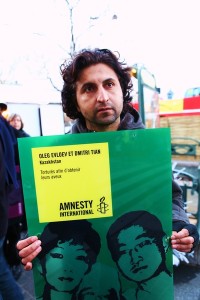
Halil Savda at a Write for Rights event in France on Human Rights Day, December 10, 2011 (Photo Credit: Michael Sawyer for Amnesty International).
This May 15, International Conscientious Objectors Day, is an opportunity to both celebrate the steady acceptance of this fundamental right and to highlight those countries who have not taken the basic steps to protect it.
In Europe for example, the European Court of Human Rights (ECHR) recognized conscientious objection as a protected right in 2011 when, in Bayatyan v Armenia, it ruled that conscientious objection was subject to Article 9 of the European Convention on Human Rights, which protects freedom of thought, conscience, and religion. Unfortunately, as an Amnesty statement released today highlights, three European countries, Armenia, Azerbaijan, and Turkey, still refuse to accept this basic obligation under international law.
Amnesty’s position on conscientious objection is clear:
The right to conscientious objection to military service is not a marginal concern outside the mainstream of international human rights protection and promotion. The right to conscientious objection is a basic component of the right to freedom of thought, conscience and religion – as articulated in the Universal Declaration on Human Rights, the International Covenant on Civil and Political Rights and the European Convention for the Protection of Human Rights and Fundamental Freedoms.
In Armenia, Azerbaijan, and Turkey, this basic right still goes unrecognized and individuals are still prosecuted for following their conscience. In September 2012, for example, a local court in Azerbaijan sentenced a young Jehovah’s Witness, Fakhraddin Mirzayev, to a year in prison for his refusal, based on his declared beliefs, to serve in the military. In Armenia, as well, “young male Jehovah’s Witnesses continue to be imprisoned in ever larger numbers and for longer periods because their beliefs prohibit them from performing military service.”
In Turkey, not only are prosecutions of conscientious objectors an on-going concern, but merely speaking publicly in favor of the right to conscientious objection may be prosecuted under Article 318, which makes “alienating the people from the armed forces” a criminal offense. As Amnesty’s recent report on freedom of expression in Turkey describes, under this statute, Halil Savda has repeatedly been prosecuted for his advocacy of the right to conscientious objection.
Amnesty has called on Turkey to repeal 318. It also calls on all three countries to address the issue of conscientious objection, by taking these basic steps:
1. Honor their long overdue commitments to recognize the right to conscientious objection to military service.
2. Ensure that any alternative to military service is genuinely civilian and non-punitive in length.
3. Any persons imprisoned because of their refusal to perform military service for reasons of conscience or profound conviction must be released immediately.
Tomorrow, May 15, would be the ideal time for these countries to act. They must not let another year go by.
A good about turn of phrase occurs re drugs. There is no "drug related crime…there IS "prohibition related crime".
Whether there is a tipping point and when it might ensue are still arguable. One should not engage in debris removal of convenience without greater deliberation. If the environment is unstable, removal could drive instability rather than moderate it. The most cogent reason for removal is eliminating specific persistent threats to important active satellites. The value would be demonstrated through fewer close approaches whereas removing objects to mitigate cascading would have no perceptible outcome for decades, if ever.